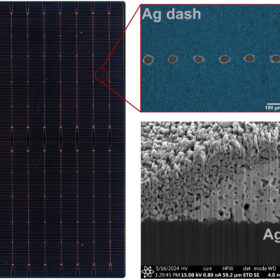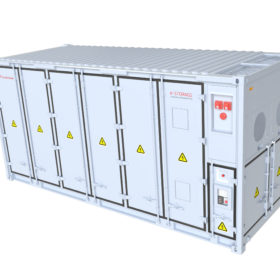Agrivoltaics offer more advantages in arid regions, new research finds
New research from France has compared the performance of agrivoltaics in Spain and the Netherlands and have concluded that the former – a dry region with high solar radiation levels – offer more technical advantages over the latter, which is characterized by abundant rainfall and lower solar radiation.
Beretta unveils residential air-to-water heat pump
The Italian manufacturer said its new R32 heat pump has a coefficient of performance of up to 5.2 and a heating capacity of up to 16 kW. It is available in either single-phase or three-phase versions.
Danish startup launches solar tile for pitched roofs
Solartag has developed a 71 W solar tile with a weight 14.2 kg/m² and a power conversion efficiency of 16%. The new product relies on black PERC cells and is standardized for mass production, according to the manufacturer.
Researchers warn of ‘hidden contaminants’ that could increase TOPCon, HJT solar module degradation
Australian researchers have identified five contaminants that could increase damp heat-induced degradation in TOPCon and heterojunction cells and modules. Their analysis has shown these contaminants could originate from improper handling during cell or module processing.
TCL SunPower launches back contact solar modules
The SunPower M Class product portfolio offers solar panels for the residential and commercial markets featuring the company’s latest back contact solar technology. The panels are expected to reach 25% efficiency for residential applications up to 500 W and 24.4% for commercial applications up to 660 W.
Silver-lean screen-printing can reduce silver use in TOPCon solar cells by 40%
An international research team has developed a metallization technique for TOPCon solar cells that can reportedly reduce silver usage in the devices’ rear side by 85%. The scientists replaced the commonly used Ag fingers with intermittent Ag dashes for contact formation and Ag-free fingers and busbars for electrical conduction.
Longi launches residential heterojunction back-contact solar module with 25% efficiency
Longi has developed the Hi-MO S10, a residential heterojunction (HJT) back-contact solar module with 25% efficiency, combining 27.6%-efficient cells with up to 510 W output and 252.3 W/m² power density.
How to make solar module stockpiling cost-effective
Researchers investigated which solar module stockpiling conditions could help to ensure stable solar PV deployment at the lowest cost in Europe. The scientists demonstrated that stockpiling is cost-effective primarily under unfavorable import conditions.
Canadian Solar’s storage unit launches 5 MWh battery
The battery unit of the Chinese PV manufacturer said its new large-scale battery has a lifecycle of over 12,000 cycles. The system has a nominal capacity of 5 MWh and a roundtrip efficiency of up to 95%.
Global PV installations may hit 655 GW this year, says SolarPower Europe
Global PV installations could reach 655 GW in 2025, up from 597 GW in 2024, according to SolarPower Europe’s latest market outlook, which puts total installed capacity at 2.2 TW.











